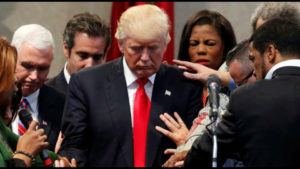King of This World: Irreligious Trump Remains Popular with Evangelicals
In case you forgot, on August 21 Donald Trump thanked conspiracy theorist Wayne Allyn Root for saying that Israeli Jews love the president, “like he’s the King of Israel … like he is the second coming of God.” (In a surprise to no one, Trump conveyed his pleasure for this in a 4:30 a.m. tweet.) Despite the casting of Trump as savior, and despite his declaration hours later to reporters outside the White House that he was “the chosen one,” evangelicals don’t see him that way. Or do they?
Much has been written about white evangelical support for Donald Trump’s presidency—how it started, why it’s lasted, and what, if anything, could shake it. In Elizabeth Bruenig’s August 14 Washington Post opinion essay, she details her travels through Texas engaging directly with Christian evangelicals, who comprise the state’s largest voting bloc and who overwhelmingly voted for Trump in 2016.
It’s true that this demographic almost always votes Republican. But what is it that white evangelicals, in Texas and the rest of the country, liked so much (and still do) about this one particular Republican candidate, whose well-publicized behavior over many decades is anything but morally superior?
“By voting for Trump—even over more identifiably Christian candidates—evangelicals seem to have found a way to outsource their fears and instead reserve a strictly spiritual space for themselves inside politics without placing evangelical politicians themselves in power,” Bruenig writes. “In that sense, they can be both active political agents and a semi-cloistered religious minority, both of the world and removed from it, advancing their values while retreating to their own societies.”
In this sense, you could say evangelicals chose Trump because he chose them, making it clear he was willing to do whatever it took to gain their loyalty and strengthen their agenda. To act as the heavy, the fixer; the money and the muscle. (Remember what Trump said at the 2016 Republican National Convention: “I alone can fix it.”)
Take abortion. I remember reading that on Election Day it was the most searched term on Google. Yes, evangelicals care a lot about halting legal and safe abortion. And so they cared deeply that Trump would nominate anti-abortion judges. They also care about preserving their religious license to discriminate against health providers who honor women’s reproductive rights and to discriminate against LGBTQ individuals, a so-called religious freedom Trump has dutifully protected. And let’s not forget that recognizing Jerusalem as the capital of Israel was a long-sought goal; here, Trump did not disappoint (as his predecessors had), officially moving the US Embassy from Tel Aviv to Jerusalem last year. For a not-insignificant population of evangelicals, reestablishing the borders of Israel according to what God promised in the Bible is key to bringing about the apocalyptic end times and the second coming of Jesus.
Bruenig identifies a type of evangelical support for Trump that is focused more on this darker, more eschatological mindset than on current politics and culture war issues. She quotes researcher Lydia Bean, who has studied the politics of evangelicals and describes their embrace of Trump as
a fortress mentality, where it’s like—the best we can do is lock up the gates and just pour boiling oil over the gates at the libs.… one of the things that’s changed since I did my fieldwork at the very end of the Bush administration is a rejection of politics in general as a means to advance the common good, even in a conservative vein.
One wonders if this turn toward chaos is what Robert Jeffress, one of Trump’s staunchest and highest-profile supporters in the evangelical community, had in mind when he appeared on Fox News after the House impeachment inquiry ignited in late September. Jeffress warned of a “Civil War-like fracture in this nation from which our country will never heal,” if Trump were removed from office, noting that he’d never seen evangelicals more angry. “If you read the scripture,” the pastor told Bruenig back in April at his First Baptist megachurch in Dallas, “it’s not: things get better and better and more evangelical-friendly or Christian-friendly; it is, they get worse and more hostile as the culture does.”
For those who long to see biblical prophecy fulfilled, could the conclusion really be: Who better to make things worse than Donald Trump?

